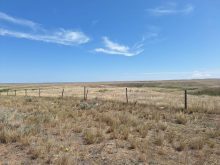Growing demand in China for canola oil and protein products will likely lead to it easing restrictions against Canadian canola, but it’s unclear when that will happen, said the top executive with James Richardson International, Canada’s No. 2 crop handler.
“I think that (demand) is going to put pressure on people to take a look at ways of opening that up, freeing some of those restrictions that presently exist,” said Curt Vossen, president of privately held Richardson, in a wide-ranging interview with Reuters. “Sometimes in these things, there’s an overreaction that’s followed by a tendency to get a little more realistic.”
Read Also

Farming Smarter receives financial boost from Alberta government for potato research
Farming Smarter near Lethbridge got a boost to its research equipment, thanks to the Alberta government’s increase in funding for research associations.
China said last year it would require Canadian canola shipments to bear certificates guaranteeing the absence of blackleg disease, which is common in Canada, but allowed a transition period through the 2009-10 crop year, which ends July 31. In the meantime, China has allowed Canadian exporters to ship blackleg canola only to certain ports located away from domestic rapeseed-growing areas.
Exporters have continued to ship a “reasonable” volume of canola seed into China despite the restrictions, Vossen said.
“It’s certainly not without problem. You will inevitably limit the ability to move product in the short term to China, but so far I wouldn’t say it’s been profound.”
Canadian agriculture emerges from the global recession largely unscathed, Vossen said. The grains and oilseeds sectors are strong and although the livestock sector is hurting, much of its challenges are due to cyclical supply and demand factors, he said.
Richardson, based in Winnipeg, Manitoba, continued building a new 850,000-tonne per year canola crushing plant at Yorkton, Saskatchewan through the recession.
The plant will open in May and is undergoing 60 to 90 days of commissioning, resulting in a target to produce oil suitable for human consumption in June, Vossen said.
Richardson currently operates a canola crusher at Lethbridge, Alberta, one of the few such Canadian plants that the U. S. Food and Drug Administration has not restricted for detection of salmonella bacteria in canola meal. The new plant will use the same manufacturing process, Vossen said.
The pace at which the plant ramps up production will be in sync with how the market is able to absorb the additional oil and meal, Vossen said. Louis Dreyfus Canada Limited and Mitsui & Co recently opened a similar plant in Yorkton.
“I don’t see anything in the demand in the market that would suggest there should be any restriction” on volume, Vossen said.
Regina, Saskatchewan-based Viterra Inc., Canada’s top grain handler, became a major global player last year in buying ABB Grain of Australia.
Growth by Viterra doesn’t change the strategy at Richardson, which competes with other global handlers like Cargill Inc., Archer Daniels Midland and Bunge, Vossen said.
“We think we can be very strong and contributory in defined markets and have a significant, critical mass. Whether Viterra or ADM or Cargill have a global presence really makes no difference to us … We don’t feel we have to be in every market to be successful.”














